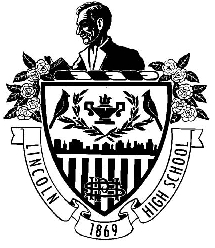
Lincoln High School (LHS) is a public high school located in the Goose Hollow neighborhood of Portland, Oregon, United States. It was established in 1869 as Portland High School. Its attendance boundary includes Downtown Portland, Goose Hollow, Northwest Portland, and a part of West Haven-Sylvan.
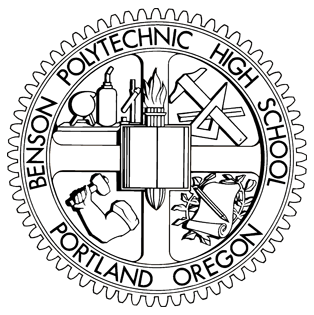
Benson Polytechnic High School (BHS) is a technical public high school in the Portland Public Schools district. Its 9-acre (3.6 ha) campus is located in the Central Eastside commercial area of Portland, Oregon, United States. Students are given a special emphasis in a technical area. The school is a member of SkillsUSA and Health Occupations Students of America.

Jefferson High School is a public high school in Portland, Oregon, United States.

Portland Public Schools is a public school district located in Portland, Oregon, United States. It is the largest school district in the state of Oregon. It is a PK–12 district with an enrollment of more than 49,000 students. It comprises more than 100 locations, including 79 schools and other sites that are maintained within the district.

Hillsboro High School is a public high school in Hillsboro, Oregon, United States, and is the oldest high school in the Hillsboro School District. It is also the smallest high school in the district.

Washington High School was a high school in Portland, Oregon, United States, from 1906 to 1981. After fire destroyed the original building, a new building was completed in 1924. The school merged with Monroe High School in 1978 to become Washington-Monroe High School. The school closed shortly after in 1981. A few years later it was used as the Children's Services Center, a multipurpose social service facility that also provided day care and other programs for at risk youth. After that the building was vacant for many years. It was also used for a time as a location for administrative offices for the Portland Public Schools.

Arthur Wood Tuck was an American track and field athlete. In 1919, he singlehandedly won the Oregon state high school track and field team championship for Redmond High School. He later competed for the University of Oregon track and field team and represented the United States in the 1920 Summer Olympics in Belgium.
Freeman Charles Fitzgerald was an American professional football player. He was six feet in height and weighed 195 pounds. He played college football for the Notre Dame Fighting Irish from 1913 to 1915 and was selected as an All-American at the guard position in 1915. He later played professional football for the Massillon Tigers (1916), Youngstown Patricians (1917), and Rock Island Independents (1920–1921).
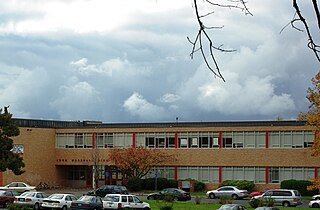
Marshall High School is a former public high school in Portland, Oregon, United States. The school opened on September 6, 1960, and is named after John Marshall, the fourth Chief Justice of the United States. The school was closed in 2011 as the Portland Public Schools district moved to consolidate students and resources into fewer high schools.

Roosevelt High School (RHS) is a public high school in Portland, Oregon, United States. It is located in the St. Johns neighborhood.

James John (1809–1886) was founder of the settlement of St. Johns in Oregon. The area later became a city when it passed a charter in 1902. It was annexed into Portland in 1915. John worked as a general store and ferry operator across the Willamette River to Linnton. He once served as Justice of the Peace and was twice an election judge. John was born in Ohio and first settled in Indiana with his wife and child where John worked as an educator. He joined the Bartleson–Bidwell Party in 1841, who were one of the first groups that trekked the California Trail. By this time, John's wife and child had died. He came to Oregon Country in the employment of the Hudson's Bay Company in 1843 after making it to Sacramento Valley.
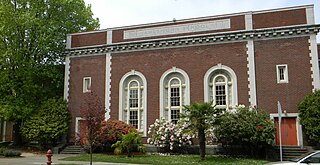
James John Elementary is a K–5 school within the Portland Public Schools district located in the St. Johns neighborhood of north Portland, Oregon, United States. Built in 1929, it feeds graduates to George Middle School which then feeds Roosevelt High School.

Thomas Jefferson is a 1911 bronze statue of a seated Thomas Jefferson created by Karl Bitter for the Cuyahoga County Courthouse in Cleveland, Ohio, United States.

Bonita was a steamboat which operated on the Willamette and Yamhill rivers. This boat was renamed Metlako in 1902, and operated under that name until 1924 on the Columbia River and its tributaries, the Cowlitz, Lewis and Lake rivers. In 1924, Metlako was renamed B. H. Smith Jr., operating under that name until 1931, when the steamer was abandoned. As Bonita, in September 1900, this vessel was the first steamer to pass through the Yamhill locks.
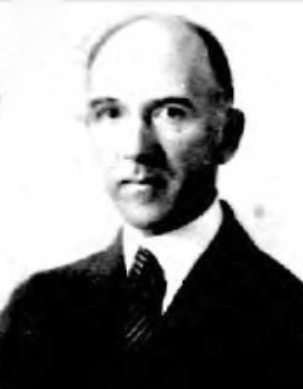
Frederic "Freddie" Stanley Dunn was an American scholar of classical studies on the faculty of the University of Oregon (UO), and a Ku Klux Klan leader.

Harley James Overturf was an American politician and businessman from the state of Oregon. He was a Republican who served four years in the Oregon House of Representatives, where he represented a large rural district in eastern Oregon. Overturf Butte in Bend, Oregon, is named in his honor.

La Center was a small stern-wheel steamboat that operated from 1912 to 1931, mostly on the Lewis and Lake rivers in southwest Washington, on a route to and from Portland, Oregon along the lower Columbia and lower Willamette rivers.

Hosea Thompson Botts (1873–1963) was an American attorney and politician who served as Mayor of Tillamook, Oregon from 1905 to 1907, spanning two terms.

Swan Island is located on the Willamette River about 4.5 miles (7.2 km) downriver from downtown Portland, Oregon, United States. Although presently connected to the Willamette's east bank by land fill, it existed as a river island under natural conditions.
Ida A. Kidder was a pioneering librarian and the first professional librarian at Oregon Agricultural College, now Oregon State University. She was so loved by her students that they nicknamed her “Mother Kidder”.

















